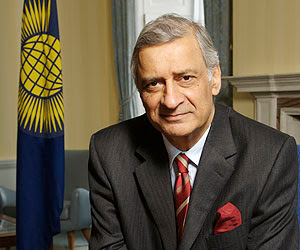(From the Commonwealth Secretariat website, 22 July 2008)
“We say ‘women count’, but the facts say otherwise” – Sharma
“We say ‘women count’, but the facts say otherwise” – Sharma
Gender equality has a long way to go in the world, but gender mainstreaming goes a long way to start evening the odds,
 Commonwealth Secretary-General Kamalesh Sharma said on Monday 21 July 2008.
Commonwealth Secretary-General Kamalesh Sharma said on Monday 21 July 2008.Mr Sharma was speaking at the opening of a two-day workshop on fostering gender equality in the public service, held at Marlborough House in London. Around 30 gender specialists and educators gathered to share experiences under the theme “Gender Mainstreaming for the Public Sector: using Open and Distance Learning to build capacity.”
The Secretary-General said, “We say ‘women count’, but the facts say otherwise.” He reported that while women make up half the world’s population, they work two-thirds of the world’s working hours, produce half of the world’s food, and yet earn only 10 per cent of the world’s income and own less than one per cent of the world’s property. “Women’s wellbeing, education, voice, and capacity to make a living are the real litmus test as to the health of a society,” he said.
 “As such, the prognosis must not be good. Half a million women die every year in pregnancy or childbirth, and the face of HIV and AIDS is now that of a young African woman.”
“As such, the prognosis must not be good. Half a million women die every year in pregnancy or childbirth, and the face of HIV and AIDS is now that of a young African woman.”
The way forward was through ‘mainstreaming’ gender policy – which means ensuring a gender equality perspective in all the policies and sectors of national and local government, Mr Sharma concluded.
The meeting, convened by the Secretariat’s Gender Section, the Governance and Institutional Development Division (GIDD) and the Commonwealth of Learning is focusing on using Open Distance Learning to build capacity in the public service, so that gendered thinking can be applied to more government policies. Jacqueline Wilson, Director of GIDD said that the workshop was an opportunity to target senior policy makers who would not normally be available to attend face to face training sessions.
 “As such, the prognosis must not be good. Half a million women die every year in pregnancy or childbirth, and the face of HIV and AIDS is now that of a young African woman.”
“As such, the prognosis must not be good. Half a million women die every year in pregnancy or childbirth, and the face of HIV and AIDS is now that of a young African woman.”The way forward was through ‘mainstreaming’ gender policy – which means ensuring a gender equality perspective in all the policies and sectors of national and local government, Mr Sharma concluded.
The meeting, convened by the Secretariat’s Gender Section, the Governance and Institutional Development Division (GIDD) and the Commonwealth of Learning is focusing on using Open Distance Learning to build capacity in the public service, so that gendered thinking can be applied to more government policies. Jacqueline Wilson, Director of GIDD said that the workshop was an opportunity to target senior policy makers who would not normally be available to attend face to face training sessions.
The 2008-2012 Commonwealth Strategic Plan sets out the Secretariat’s commitment to adopting a rights-based approach to development, and to mainstreaming gender across policy and programmes.








